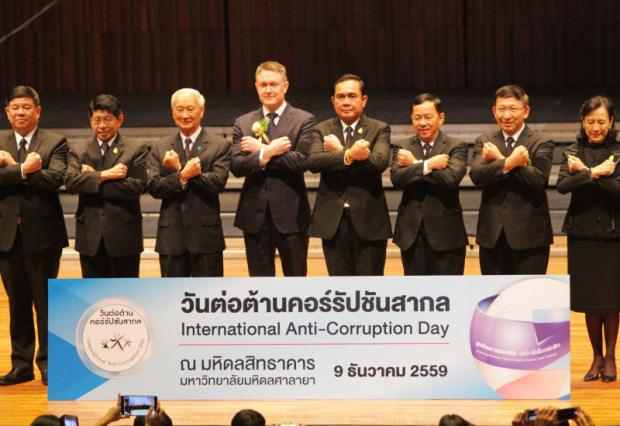
Prime Minister Prayut Chan-o-cha on Friday urged all parties to join forces to fight on to curb corruption, a key factor blamed for failed state management in the past and which affects Thailand's economy, society, politics, education and public expenditure.
As a result, the public is at the receiving end of the consequences of corruption because if state budgets are not spent honestly or effectively, the people lose the chance to benefit from public spending, Gen Prayut said at an event marking International Anti-Corruption Day on Friday.
The prime minister led a formal ceremony held at Mahidol University and led a pledge to fight corruption.
Other cabinet members and foreign ambassadors to Thailand also attended the event.
The activity was intended as an annual reminder of the importance that everyone must take part in the national fight to eradicate corruption and how this problem is seriously affecting the country, he said.
The event was also aimed at commemorating the late King's sacrifices for the nation, he said.
One important mechanism employed by this government to tackle corruption is the Pracharat (civilian-government) approach, in which the public and private sectors are drawn together to actively take part in keeping the government's work in check in all aspects, said Gen Prayut.
With this mechanism in place, all sectors in society are working together to prevent corruption and make the national fight against graft more sustainable, he said.
"It's most important for Thai society to raise [greater] awareness about and [better] understand the corruption problem ... and we need to join hands to foster an anti-corruption culture in Thai society," he said.
For its part in this effort, the government has added anti-corruption mechanisms at three levels -- national, policy-steering and operational levels, he said.
At the national level, the National Anti-Corruption Committee (NACC) was set up and the Centre for National Anti-Corruption (CNAC) was established as the main anti-corruption policy steering body, he said.
At the operational level, an anti-corruption centre has been set up in every ministry, he said.
Aside from these bodies, the government has also set three clear goals in its efforts to suppress corruption, he said, adding that these goals are that existing corrupt individuals must be brought to justice, efforts will be made to prevent people from engaging in corrupt activities, and awareness increased to change attitudes and prevent corruption from taking place.
In Transparency International's 2014 Corruption Perceptions Index, Thailand was ranked 85th, but climbed to 76th place in the 2015 Index, said the premier.
Transparency International has published the Corruption Perceptions Index (CPI) since 1995, ranking countries annually by their perceived levels of corruption, as determined by expert assessments and opinion surveys. The CPI generally defines corruption as "the misuse of public power for private benefit".
The CPI currently ranks 168 countries on a scale from 100 (very clean) to 0 (highly corrupt).
Hopefully, Gen Prayut said Thailand should earn an even better ranking in the CPI for this year. At the end of his speech, the prime minister led participants in a vow to fight corruption beginning with themselves.